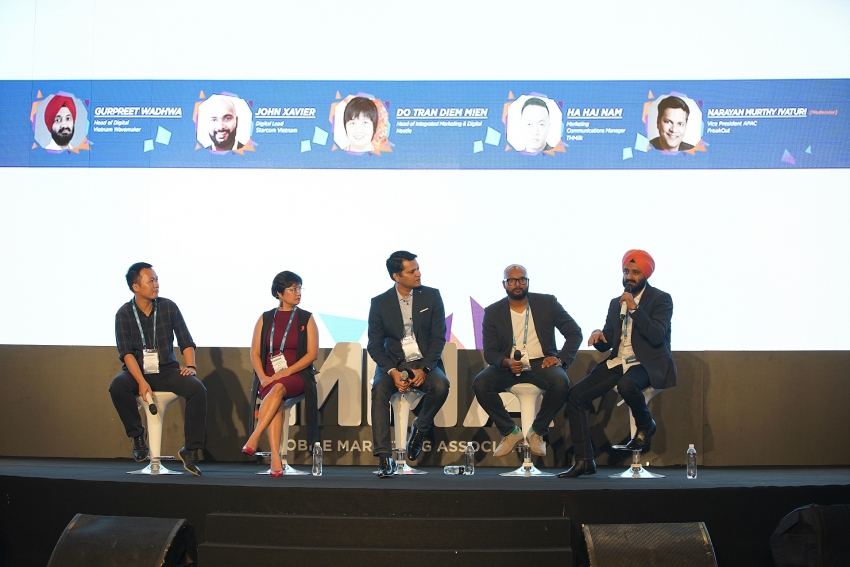Vietnam 2018 Mobile Marketing Forum – shape the future
With the theme “Shape the Future,” panellists and participants of Vietnam 2018 Mobile Marketing Forum shared and exchanged topics related to mobile devices which have a strong impact on the future of enterprises.
 |
| David Porter, vice president, Global Media at Unilever Asia, Africa, Middle East, Turkey and Russia spoked at the forum. |
The forum was attended by giant global companies such as Nestlé, Unilever, Coca-Cola, Suntory Pepsico, Friesland Campina, and leading domestic companies like Bitis, TH True Milk, VNG, and global media agencies such as Group M, Nielsen, Decision Lab, Starcom, and Wavemaker.
At the forum, participants focused on the effects of mobility on the future development of business from the perspective of leaders, as well as the relationship between the agency and the brand to bring success in mobile applications in marketing activities and enhance brand experience for users.
 |
| Panelists at a panel session. |
This was also the first time the "Power of Mobile Game in Vietnam"report was published in collaboration with POKKT, MMA, and Decision Lab.
The report identifies different mobile game players, their behaviour and habits, as well as opportunities and challenges for marketers as they reach consumers.
In addition, panellists and participants shared more research, such as “Future Consumers” (Generation Z), consumer approach in rural areas, and future consumption trends.
At the forum, participants also shared the stories behind the best campaigns at the SMARTIES Vietnam 2018 Awards, such as Bitis and Diana, and successful mobile application campaigns to reach consumers by Sunlight, Clear Men, and OMO.
SMARTIES 2018 is the only global mobile marketing awards in the world honouring innovation and success in the field.
According to Phan Bich Tam, country director of Mobile Marketing Association Indochina, Vietnam Mobile Marketing Forum 2018 marked the 7th consecutive year of MMA activities in Vietnam.
“This year, we have endeavoured to organise six events and professional activities to connect businesses, brands, and media companies to grow and develop a strong mobile marketing ecosystem in Vietnam," Tam said.
‘The Power of Mobile Gaming in Vietnam’ report tracks major trends and identifies key drivers in Southeast Asia’s biggest mobile gaming market. This year, the report forecast the number of mobile gamers in the country to reach 40 million by 2020.
Released in association with Mobile Marketing Association (MMA) and Decision Lab, the report provides the latest data and insights into mobile gaming trends in Vietnam.
Currently comprising of more than 28 million gamers, the country’s mobile gaming segment has been on an exponential growth trajectory and is expected to have around 40 million mobile gamers by 2020.
The report also revealed that Vietnamese users spend an average of 51 minutes a day playing mobile games, over 5-7 sessions.
Even more interesting was the distribution of mobile gamers across various demographics.
With 39 per cent and 33 per cent, the age groups of 16-24 years and 25-34 years both accounted for more than a quarter of the total gamer base, while gamers belonging to the 35-44 age group accounted for 14 per cent of the overall user base. Older users of 45-54 years were also active mobile gamers, accounting for 6 per cent of the gamer base in Vietnam.
Somewhat surprisingly, 53 per cent of mothers with kids under the age of 10 years also frequently play mobile games.
These statistics highlight how mobile gaming apps provide advertisers and brands with the opportunity to seamlessly reach out to users across all gender and age segments.
Rohit Dadwal, managing director of MMA in the Asia-Pacific, commented that while it is common to assume that gamers tend to come from the younger generations, the research has proven otherwise, and removes the stereotypes of a typical gamer. “By changing their perception of what a “gamer” is, marketers can tap into a relatively untouched space and reach out to a sea of customers. Furthermore, since 55 per cent of gamers perceive ads to be more personalised on gaming platforms, there is a much higher level of acceptance,” said Dadwal.
Aske Østergård, founder of Decision Lab, added that for decades, gamers have been stereotyped as isolated teenage boys sitting on a sofa in some dark basement space.
“But this stereotyped portrait is far from accurate. Our recent study reveals that more than half of internet-connected Vietnamese people play games on their mobile devices. Even moms with kids under 10 years old. As such, mobile gaming is now mainstream,” Østergård added.
Another interesting insight gleaned from the POKKT report was that mobile games accounted for the highest share of time spent on mobile phones by Vietnamese users (23 per cent) – more than any other activity, including social media. 68 per cent of users also admitted to playing mobile games “several times a day,” underlining how brands can use the medium to target their prospective customers at high frequency.
In-game video ads that provide rewards were also preferred to all other ad formats, with 50 per cent of mobile gamers perceiving such ads to be the least intrusive form of advertising.
What the stars mean:
★ Poor ★ ★ Promising ★★★ Good ★★★★ Very good ★★★★★ Exceptional
Related Contents
Latest News
More News
- Masan Consumer names new deputy CEO to drive foods and beverages growth (February 23, 2026 | 20:52)
- Myriad risks ahead, but ones Vietnam can confront (February 20, 2026 | 15:02)
- Vietnam making the leap into AI and semiconductors (February 20, 2026 | 09:37)
- Funding must be activated for semiconductor success (February 20, 2026 | 09:20)
- Resilience as new benchmark for smarter infrastructure (February 19, 2026 | 20:35)
- A golden time to shine within ASEAN (February 19, 2026 | 20:22)
- Vietnam’s pivotal year for advancing sustainability (February 19, 2026 | 08:44)
- Strengthening the core role of industry and trade (February 19, 2026 | 08:35)
- Future orientations for healthcare improvements (February 19, 2026 | 08:29)
- Infrastructure orientations suitable for a new chapter (February 19, 2026 | 08:15)

 Tag:
Tag:





















 Mobile Version
Mobile Version